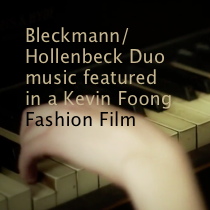
SIX TWENTY ONE : Fashion Film by Kevin Foong | Music by Bleckmann/Hollenbeck Duo


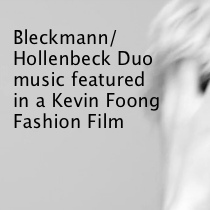
“The Blind Date Quartet…is a free improv ensemble notable for an approach that demonstrates the wide range of possibilities open to instruments most often associated with the orchestral or chamber music traditions.” – dbarbiero
“Sure enough, they triumphantly merge a cerebral game-plan with high entertainment, creating a top pick for 2009.” – Glenn Astarita
“The music features the highly personal, distinct compositional skills of Hollenbeck, Darche and Blaser, observing in an amused manner on the history of jazz, and packed with strong, playful and nuanced melodies.” – Eyal Hareuveni
![J.A.S.S. | “Santiago” [Samuel Blaser]](https://johnhollenbeck.com/wp-content/uploads/2014/10/jass-santiago.png)
![J.A.S.S. | “DRIVING LICENSE” [Alban Darche]](https://johnhollenbeck.com/wp-content/uploads/2014/10/jass-driving-licence.png)
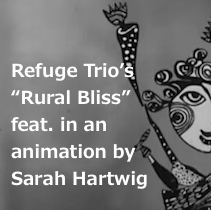
![Refuge Trio |”Winter” [Tori Amos/arr. Bleckmann]](https://johnhollenbeck.com/wp-content/uploads/2014/10/refuge-video-image-2.png)
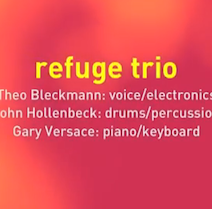
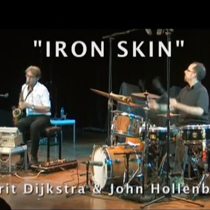
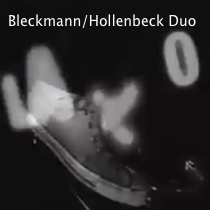
![J.A.S.S. | “Jazz Envy” [John Hollenbeck]](https://johnhollenbeck.com/wp-content/uploads/2014/10/jass-video-image.jpg)
“They are all among the most inventive and exciting players and composers on the scene and they display their first-call skills on their self-titled debut.”
– Terrell Holmes
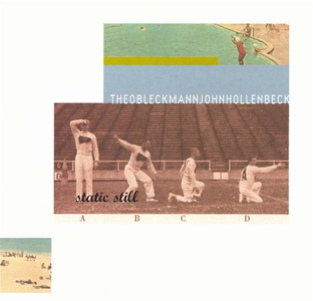
Theo Bleckmann voice, loops, toys, piano
John Hollenbeck percussion, drums, toys, piano
Two New York improvisers intimately create melodious and mercurial soundscapes. Theo and John forge an ethereal bond born of a long track record of working together on numerous projects. In their duo performances, they work with layering, contrast and harmony using voice, drums, percussion, found objects, low-tech electronic gadgets and toys. Static Still is their first recording on release on gpe records.
“Defying categorization has become as predictable as any of the old categories ever were. It’s simply really: just reference music without committing to any of it. So how beautiful it is to hear two players who explode all boundaries with their embrace-who commit to all, and all at once…a rich and strange world of noise, motion and melody, all of it infused with wit and unerring musicality. The myriad strains are all there, from country to jungle to operatic, but they’re drawn out with a tender glance, not a wink”. – Mark Fefer, Seattle Weekly
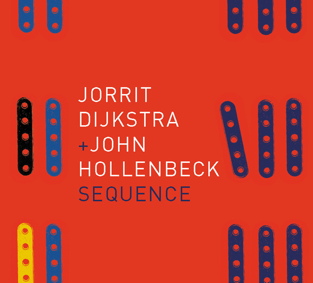
Jorrit Dijkstra
alto saxophone, lyricon, analog electronics, tin whistles, music box
John Hollenbeck
drums, percussion, autoharp, kalimba
whistle baby composed by jorrit dijkstra, all other compositions by jorrit dijkstra and john hollenbeck
John Hollenbeck and Jorrit Dijkstra have been playing duets on and off since 1998. In their improvisations they investigate the minuscule details within the sonic palette of their instruments by “zooming in” to a whole new world of sonic textures. With the help of some analog electronics, they place their sounds under an imaginary microscope, to orchestrate the overtones, micro-beats, wind flows, clicking of the pads, impact of the stick on the drumhead, and sub tone effects, without losing their strong sense of melody and groove. They also share an interest in improvising with multiple-tempo layerings, melodic cells, cut and paste methods, extended techniques and integrating uncommon (analog) instruments such as the Autoharp and the Lyricon. Their music shows influences from Ornette Coleman, Steve Lacy, György Ligeti, and Conlon Nancarrow, as well as minimalists like Morton Feldman, and ambient music pioneer Brian Eno. Their debut CD “Sequence” on Trytone Records has received critical acclaim in the international press.
Saxophonist and composer Jorrit Dijkstra has been an active member of Amsterdam’s vivid jazz and improvisation scene since 1985, before moving to Boston early 2002. The critical press compares his clear, flexible sound and lyrical improvisation to Ornette Coleman, Paul Desmond and John Zorn, showing the broad spectrum of his saxophone style. Besides the alto saxophone he plays the Lyricon (the first electronic wind instrument from the 70’s) and uses electronics to process his saxophone sounds live on stage. He has released ten CDs of his own music on the Songlines, BVHaast, Trytone, Skycap and Clean Feed labels, and he has worked with Anthony Braxton, Gerry Hemingway, Herb Robertson, Barre Phillips, John Butcher, Willem Breuker, and Guus Janssen. In 1995 he received the prestigious Podium Prize from the Dutch Jazz Foundation, and in 1998 a Fulbright grant to study and teach at the New England Conservatory in Boston. As a composer, Jorrit has written commissions for the Amstel Saxophone Quartet, Tetzepi Big Band, Kaida, Duo X, and The Harvard Jazz band. Jorrit is current projects include The Flatlands Collective (with musicians from Chicago) and his eight-piece ensemble Pillow Circles, commissioned by the North Sea Jazz Festival 2009. In Boston he is active with Curt Newton, Pandelis Karayorgis, James Coleman and Steve Drury.
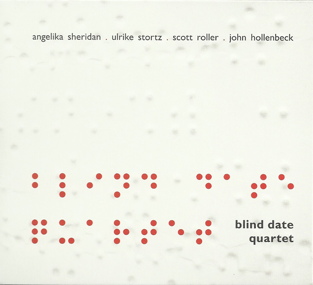
Angelika Sheriden flutes
Ulrike Stortz violin
Scott Roller cello
John Hollenbeck percussion
Blind Date Quartet is a brilliant new free-improvising quartet made up of Angelika Sheridan, Ulrike Stortz, Scott Roller and John Hollenbeck, all musicians who have been active as soloists, composers, and ensemble players in a wide variety of renowned formations spanning the entire spectrum of musical styles and non-styles ranging from classical and contemporary chamber music through myriad variants of jazz on to world music and everything in-between and beyond. Their interactions are characterized by breathtaking reactions, startling combinations and simultaneities, instantaneous changes of material and textures, all in a context of concentrated and unified development, spinning out complex and very convincing musical forms.
The name of the group derived from the first encounter of the ensemble for a concert in Berlin for the “Klangbildung” festival at the Exploratorium in May 2009, where Scott Roller (playing the “matchmaker”) brought the other three musicians (with whom he had already performed in various contexts) together for the very first time shortly before the concert. The enthusiastic reception of that first concert was so overwhelming and the musicians’ joy at this new formation so profound that further concerts and recordings seemed inevitable. Blind Date also underlines (in a tongue-in-cheek sort of way) the spontaneous and surprising nature of the collective compositions created by the quartet.
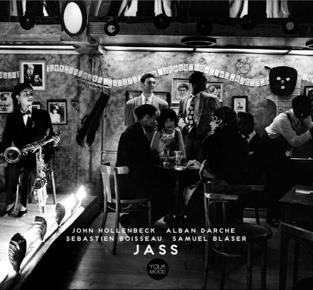
John Hollenbeck drums & percussion
Alban Darche tenor saxophone
Samuel Blaser trombone
Sébastien Boisseau double bass
“This collective quartet keeps a delicate balance between its four musicians, emphasizing the organic highly melodic flow within its compact, well-constructed compositions. Darche and Blaser’s playing stresses a beautiful singing and conversational quality while Hollenbeck and Boisseau vary the rhythmic basis constantly, alternating between loose pulses, exploratory sounds, and light swinging ones…Highly impressive debut that calls for following meetings of this quartet. ✭✭✭✭ – Eyal Hareuveni, All About Jazz
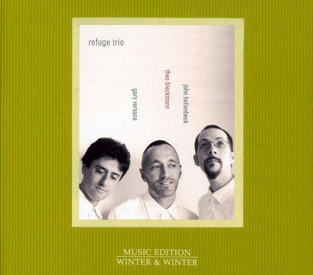
Gary Versace
accordion, piano, keyboard
John Hollenbeck
vibraphone, percussion, crotales
Theo Bleckmann
vocals, live electronics processing
“The musical sound and scope of Refuge Trio resembles a sanctuary of genre-morphing frameworks, neatly compacted into a conspicuous group-focused mindset…The progressive and versatile jazz stylists that form Refuge Trio have covered an expansive musical terrain amid solo works and various ensemble permutations. On paper, something unique and, perhaps, extraordinary would be expected. The group meets such expectations in this multihued, self-titled program, teeming with polytonal contrasts and engaging song-forms.”
– Glenn Astarita, All About Jazz
“The alchemy practiced by percussionist John Hollenbeck and vocalist Theo Bleckmann has always been extraordinary. […] Adding Gary Versace’s spectral accordion and impressionistic keyboards only deepens and broadens the sonic landscape. As with everything Bleckmann and Hollenbeck do, this recording is full of tiny, stark details, from the singer’s precise diction to the acrid decay of some of the drummer’s metallic instruments. […] What dominates however, is Bleckmann’s distinctive voice … it is a haunting, memorable instrument.” ✭✭✭✭ – Downbeat
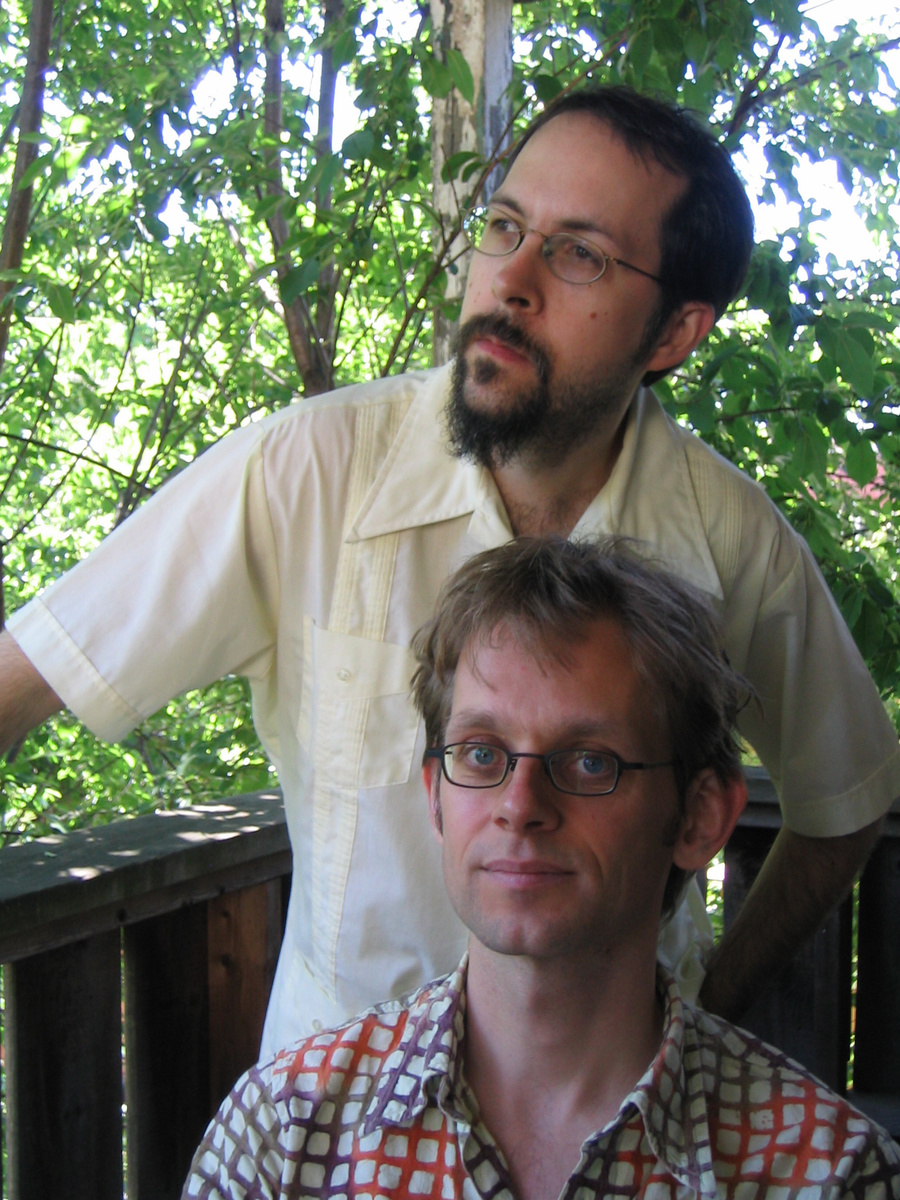
Jorrit Dijkstra alto saxophone, lyricon, analog electronics John Hollenbeck drums, percussion, toys John Hollenbeck and Jorrit Dijkstra have been playing duets on and off since 1998. In their improvisations they investigate the minuscule details within the sonic palette of their instruments by “zooming in” to a whole new world of sonic textures. With the help of some analog electronics, they place their sounds under an imaginary microscope, to orchestrate the overtones, micro-beats, wind flows, clicking of the pads, impact of the stick on the drumhead, and sub tone effects, without losing their strong sense of melody and groove. They also share an interest in improvising with multiple-tempo layerings, melodic cells, cut and paste methods, extended techniques and integrating uncommon (analog) instruments such as the Autoharp and the Lyricon. Their music shows influences from Ornette Coleman, Steve Lacy, György Ligeti, and Conlon Nancarrow, as well as minimalists like Morton Feldman, and ambient music pioneer Brian Eno. Their debut CD “Sequence” on Trytone Records has received critical acclaim in the international press.
“…improv electronica? grotesque minimalism? cyborg jazz? soundscapes for human drum machine and autoharp?…textures that never existed before and will never be heard again…” -Nate Dorward, parisatlantic.com
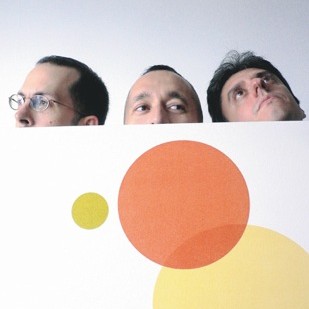
Gary Versace
accordion, piano, keyboard
Theo Bleckmann
vocals, live electronics processing
John Hollenbeck
drums/percussion, vibraphone, crotales
Refuge Trio takes its name from the Joni Mitchell song “Refuge of the Roads”. The collaborative trio was formed to play at the 2002 Wall-to-Wall Joni Mitchell Marathon Concert at Symphony Space in NYC. Since then, they have continued to explore delicate and playful music with mystery and exuberance. Their unique voices also play an essential role in the ensembles of Laurie Anderson, Meredith Monk, Bob Brookmeyer, John Scofield and Maria Schneider. As the Refuge trio, they fashion a transformative experience for the audience with their music and spirit.
“Refuge trio explores new boundaries of new music and jazz, humor and seriousness, construction and free art, instrumental and vocal music. Bleckmann, Hollenbeck and Versace are not escaping from anything, but have rather found their refuge in a music that is great to listen to, making it possible to discover new things even after the 10th listening.”
-
Jazzdimensions
“The alchemy practiced by percussionist John Hollenbeck and vocalist Theo Bleckmann has always been extraordinary. […] Adding Gary Versace’s spectral accordion and impressionistic keyboards only deepens and broadens the sonic landscape.” – Downbeat
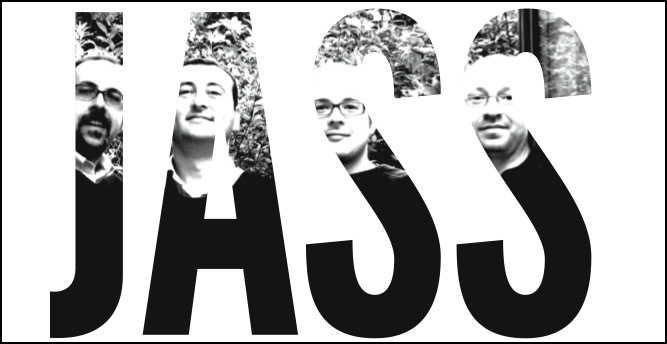
John Hollenbeck drums & percussion
Alban Darche tenor saxophone
Samuel Blaser trombone
Sébastien Boisseau double bass
JASS as in John, Alban, Samuel, Sébastien. Or as in jass, a centuries-old card game for four players, also called chibre, that is popular to this day in Switzerland and in the Austrian region of Voralberg. Or also as in jass, the term used by the Original Dixieland Jass Band lead by Nick La Rocca in March 1917 for the very first jazz-album recording.*
Thus Jass can be viewed as a semantic connection of little importance or simply an amusing etymological coincidence.
One might also suppose that some perceptive intuition, chance encounters and unplanned events such as Alban Darche’s admiration for John Hollenbeck’s Claudia Quintet and his fortuitious meeting with their drummer, the development of a real bond between Samuel Blaser and Sebastien Boisseau or the playfulness shared by the four protagonists have guided them to reveal an aesthetic glee generated by a music both modern and deeply rooted in jazz history. A music that is eminently collective, that is expertly composed but yet its natural flow allows the meaning to emerge as much in the silences as in the musical motif wrought from listening to each other’s ideas and feelings.
A first concert in Berlin in July 2011 and later, an artist’s residency in Nantes in January 2012 (where the current album was recorded ) were sufficient for these four highly demanding musicians to create, in such a natural fashion, a striking sequence of original themes whilst maintaining the group performance at its heart, whilst keeping in check demands of organisation and balance in order to allow free-flowing elements of interference, of effervescence, of intoxication and yet avoiding being side-tracked on an excess or effusiveness.
As compact and well-constructed as it appears, this music cannot be easily encapsulated by one single interpretation. It invites the listener to create one’s own impression derived from the different alternatives suggested by it’s framework and networked connections which suggest that at any moment anything is possible. The precise attention given to the form of each piece and the constant concern for a clear structure are a fertile basis for the melodic voice and the many micro-narratives which intertwine consistently on a palette of incandescent chromatics.
Bernard Aimé
translation by Catherine O’Mahony
*The dictionnary of jazz informs us that jass (or jazz) is generally associated with dance, with vitality and with the sexual act. “Chibre” is an old slang word though still used in the 20th century (by Jean Genet for example) that refers to the male organ, There is, however, no reason to speculate about the potential eroticism of the music created by JASS !
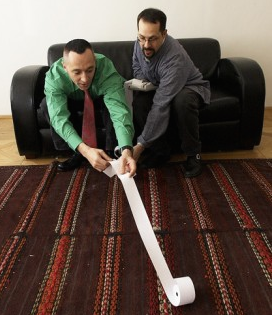
Theo Bleckmann voice, loops toys
John Hollenbeck percussion, drums, toys
[mostly free improvised, soundscapes, looping, toys, and also some songs here’n there]
Two New York improvisers intimately create melodious and mercurial soundscapes. Theo and John forge an ethereal bond born of a long track record of working together on various projects. In their duo performances, they work with layering, contrast and harmony using voice, drums, percussion, found objects, low-tech electronic gadgets and toys. Static Still is their first recording on release on gpe records.
“Defying categorization has become as predictable as any of the old categories ever were. It’s simply really: just reference music without committing to any of it. So how beautiful it is to hear two players who explode all boundaries with their embrace-who commit to all, and all at once…a rich and strange world of noise, motion and melody, all of it infused with wit and unerring musicality. The myriad strains are all there, from country to jungle to operatic, but they’re drawn out with a tender glance, not a wink”. – Mark Fefer, Seattle Weekly
“…It’s sensitive, thinking music, continually changing shape and texture; Mr. Hollenbeck is an estimable jazz drummer whose goals clearly lie beyond jazz.” – Ben Ratliff, New York Times
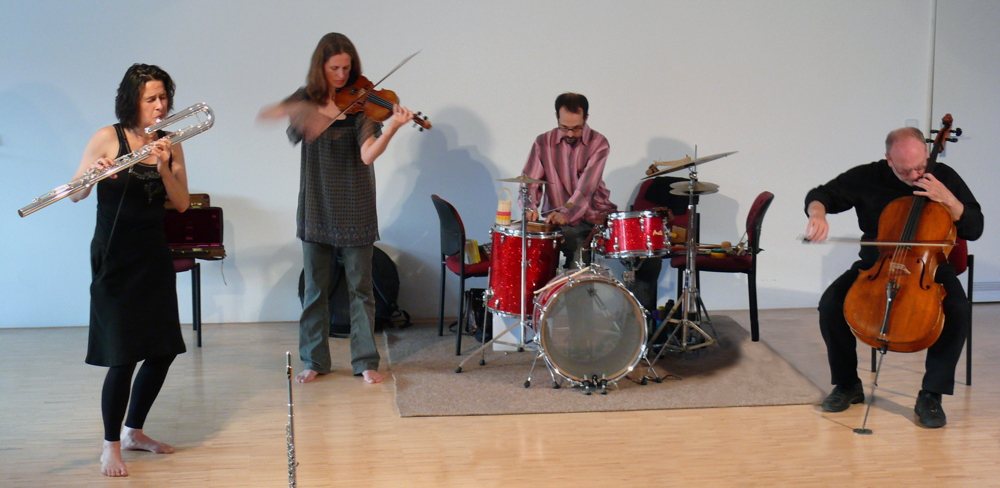
Angelika Sheriden flutes
Ulrike Stortz violin
Scott Roller cello
John Hollenbeck percussion
Blind Date Quartet is a brilliant new free-improvising quartet made up of Angelika Sheridan, Ulrike Stortz, Scott Roller and John Hollenbeck, all musicians who have been active as soloists, composers, and ensemble players in a wide variety of renowned formations spanning the entire spectrum of musical styles and non-styles ranging from classical and contemporary chamber music through myriad variants of jazz on to world music and everything in-between and beyond. Their interactions are characterized by breathtaking reactions, startling combinations and simultaneities, instantaneous changes of material and textures, all in a context of concentrated and unified development, spinning out complex and very convincing musical forms.
Angelika Sheridan, Flute/Bass Flute
Angelika Sheridan studied classical flute at the Folkwang Hochschule Essen. Her graduation was awarded with the Folkwang Prize 1990. After further studies with Ran Blake at the New England Conservatory in Boston she focused on improvisation and experimental music. She developed her own unique sound language, especially on the bass flute, combining traditional tone production and extended or self created techniques. Her work is focused besides contemporary improvised and written music on interdisciplinary projects with film, theatre, dance and visual arts. She lives in Cologne and teaches at the Hochschule für Musik. Angelika Sheridan played with master musicians and improvisers like Peter Kowald, John Butcher, Sabu Toyozumi, Gunda Gottschalk, Michel Doneda, Claudio Puntin, Sebastian Grams, Paul Lytton, Carl Ludwig Hübsch.
Ulrike Stortz, Violin
Violin studies (with Concert Diploma) in Cologne with Igor Ozim, in Stuttgart with Ricardo Odnoposoff, Wilhelm Melcher and Joachim Schall Master classes with Henryk Szeryng, Denes Zsigmondy and the Fine Arts Quartet, among others. Concerts as a soloist as well as in various ensembles for contemporary music such as Ensemble Modern, Musikfabrik, Ascolta, Varianti, Zementwerk. Intensive artistic and conceptual work with the interdisciplinary Ensemble Gelberklang, out of which the Helios String Quartet emerged. Active in a wide variety of pedagogical work ranging from private instrumental teaching to team work in innovative classroom music education projects such as “Response”. Co-founder of “Open_Music,” an initiative dedicated to promoting free improvisation projects with children and youth which has, in the past four years, been awarded many prizes and significant financial support from national, regional, city and private agencies. Represented in many recordings, primarily with contemporary music. Regular guest with the South German Radio in Stuttgart.
Scott Roller, Cello
Born 1959 in Texas USA. University studies (Cello/Composition) in Texas (Austin, Denton) and Paris, France. From 1980-83 worked with the free improvising quartet BL Lacerta on a Chamber Music America residency in Dallas, Texas, which was very significant in the formation of his concept of free improvisation.
German resident since 1983. Cellist in the Dortmund Philharmonic 1987-90. Since then, active as a free-lance cellist and composer, solo and with various ensembles: Musikfabrik NRW, Wolpe Trio, Helios Streichquartett, Ensemble Modern Orchester, Ensemble Gelberklang, Mike Svoboda Ensemble, Ensemble Recherche, among many more. Performed with these ensembles many world premiers and worked closely with many well-known composers such as Kaija Saariaho, James Tenney, Helmut Lachenmann and Nicolaus A. Huber.
Musical collaboration with artists of diverse means has played a significant role in the past 30 years of his career, especially with dancer/choreographers (Dyane Neiman, Christine Brunel, Nina Kurzeja), visual artists, multi-media theater and literature – such as his collaboration 2011-12 with the Stuttgart slam poet and literate Timo Brunke on the Theaterhaus production “The Transition of the Western World.”
In 2005 he and Ulrike Stortz founded Open_Music in Stuttgart, a non-profit organisation for improvisation and alternative artistic education in schools. Their work with pupils and students from a wide spectrum of social backgrounds has grown very rapidly with generous support from city, state, national agencies and private foundations and received many prizes and awards. Open_Music has, in the past 7 years, come to play a very significant role in Scott Roller’s work.
Both in his artistic and educational work, Scott seeks new connections between forms of expression, trans-stylistic paths, fertile fields between structure and freedom.
John Hollenbeck, Percussion
Click here for bio.
To visit Blind Date’s official website, click here.